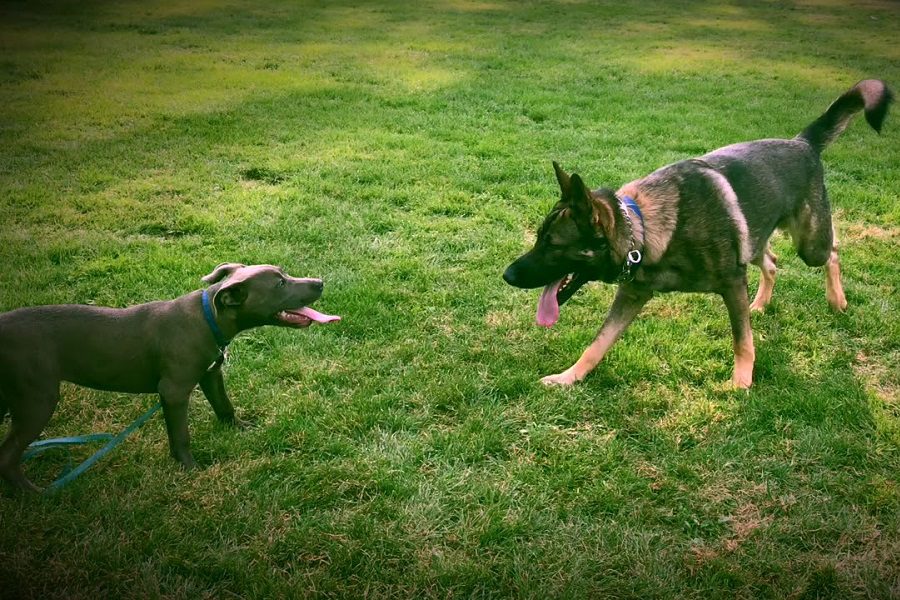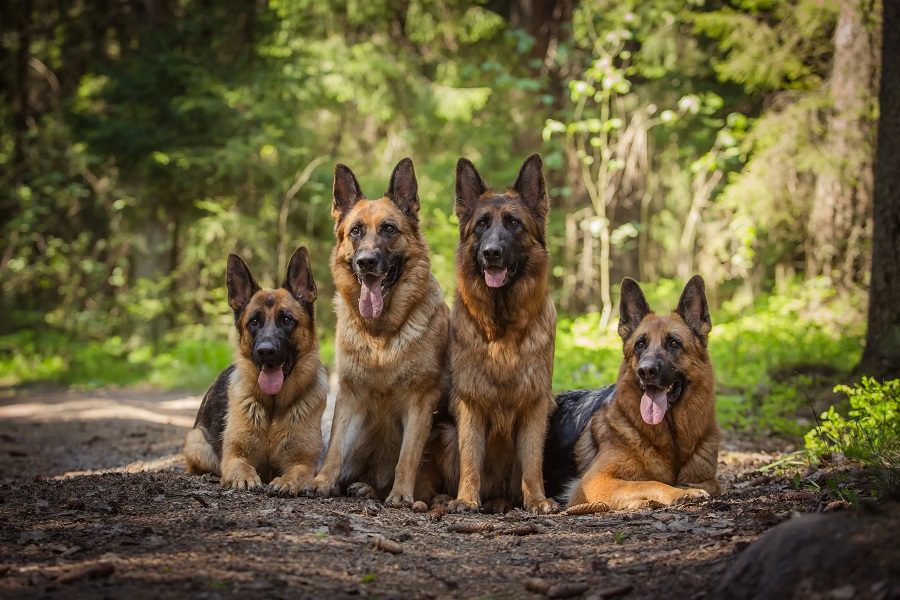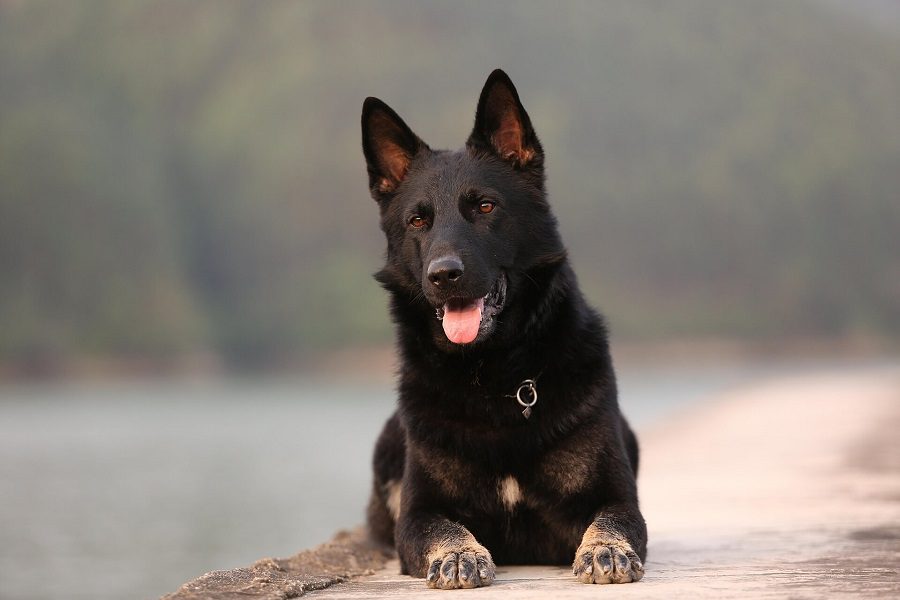Last Updated: 4 months ago
What is your favorite type of dog?
Some of us prefer small lap dogs, while others love huge dogs like mastiffs. Still, others enjoy the sweet and loving family Labrador. And some prefer a mixed breed.
But there is one breed of dog that is universally recognized for its loyalty and intelligence, and that breed is extremely popular with breeders as well as pet owners.
They simply stand out from the “pack” for a variety of reasons. This particular breed is the German Shepherd.
About German Shepherds Loyalty
German Shepherds are hard to ignore.
Their commanding presence and stunning, dark features make them among the most handsome creatures that you will ever see.
They also happen to be one of the smartest, most loyal, and most fascinating domesticated animals in the world.
They are ranked third among intelligence dogs. Now, that’s something!
Every day, humans put their lives in the hands of this amazing breed. They are trusted by the police, the military, and the blind as seeing-eye dogs.
That trust is not unfounded, either. Over centuries, these amazing canines have proven themselves time and time again as “man’s best friend.”
But, why?
What makes them so special and different?
The truth is, they are not that much different from a child. They will become what their owners mould them to be.
Origin And History
In the mid-19th century, people in Europe began to attempt to standardise dog breeds. One such citizen was particularly interested in finding the perfect working dog. The man was named Max von Stephanitz, and he had been a Calvary captain.
When Stephanitz came upon what he considered to be a perfect specimen of a working dog, he purchased it and registered it as, you guessed it, the very first German Shepherd.
The breed first became popular in the U.S. towards the end of the First World War.
Soldiers returning from battle spoke highly of the breed that had helped them in battle. They have become wildly popular and then declined since then, only to become popular again over the years.
The German Shepherd is strong and shows very well. They are athletic and agile, smart and loyal—ideal competition dogs who will do what their owner needs them to do in the heat of the moment.
This is how they have managed to work their way into the hearts of so many people over the years.
Roles As A Working Dog
It seems that German Shepherds are born ready to serve the public, work hard, and help their owners.
They are some of the most easily trained dogs that you will ever meet. Their goal is always to make their “pack leader” happy, and they will go to great lengths to make sure that happens.
It is an unfortunate reality that some people believe German Shepherds to be aggressive or violent animals. The truth is, they are highly intelligent and incredibly strong.
This can be a problematic combination if it is not used for good.
When these dogs are given purpose, work, and, of course, rewards, they are not a threat. They are fine around children and other animals, and they are incredibly loving when they are given the proper guidance.
When it comes to working roles, the German Shepherd is one popular canine. The following are some of the most common jobs they are used for:
- Law Enforcement: They work sniffing out scents for law enforcement. Working with police, they do search and rescue, detect bombs, find dead bodies, and much more. They are focused animals with incredibly keen senses of smell. It’s as if they were built for work (and they kind of were). There could be no better animal for such work.
- Formal Guide for the Visually Impaired: Formal guide dog training for the visually impaired began in Switzerland in the early part of the 20th century. At that time, all of the animals trained were female German shepherds. However, it was later determined that Labradors were better suited to that type of work. While German Shepherds are loyal and smart, they can also be aggressive and “lose their cool.” Labradors are a bit more emotionally stable. However, German Shepherds are still used for this work today. They and retrievers are actually now the two most popular breeds to be trained as seeing-eye dogs.
- Sheep Herders: You may be wondering how German Shepherds behave with other animals. It is implied by their name that they care for sheep, at least sometimes. and they do. German Shepherds are also known to be very protective of small farm animals, etc., and they may consider themselves to be a part of the “pack.” While this was much more common in past centuries, they are still used for sheep herding. When on shepherd duty, they are expected to keep sheep from leaving a specified area, preventing escape as well as the sheep damaging crops.
Traits And Personality
The breed has been ranked third for intelligence, with Border Collies and Poodles beating them out, but not by much.
In tests, they have been shown to have the capacity to learn simple tasks after only five attempts at practice. They also obey almost 100% of the time.
So, what does that have to do with their loyalty?
It’s all a learning experience, and the better that a dog can learn, the easier it is to train them. German Shepherds must learn to be loyal, just as any animal must be trained to behave in specific ways.
However, they are highly intelligent and always eager to please their owners, or “bosses.” Because of that, they learn quickly and easily follow the instructions of the humans in their lives.
Their curiosity makes them the perfect breed to be guard dogs, and their obedience and intelligence allow that inquisitive nature to translate into a hard-working and deeply loyal canine companion.
The Aggressive Side Of German Shepherds
However, German Shepherds are powerful animals, and it is essential that they are trained appropriately. When they are trained, they are very safe and are not considered to be aggressive. However, an untrained German Shepherd can present a threat.
They will be particularly wary around strangers and may growl or even attack when they feel that their home is being intruded upon.
A dog’s loyalty to their owners is a beautiful thing, but it must be harnessed, and the dog must be taught how to channel that protectiveness in a healthy way.
What can you do?
Well, first of all, you need to get the advice and help of professionals if you feel that you are unable to train your dog on your own. Aside from that, start small and understand that these things take time.
Training Tips
They must be exercised, as they are active, large animals with strong and athletic builds. Walking a German Shepherd daily is a simple way to keep it healthy and happy.
This is one of the first things that your dog should be trained to do. Teach him or her to walk beside you, not to pull, etc.
It is also an important chance for them to come into contact with new people and learn the appropriate response when meeting strangers.
This type of socialisation, under your supervision, is essential to the development of your dog’s emotional stability.
In addition, it is essential that you understand that, just as with humans, trust is earned. Once the dog trusts you, he or she will become incredibly obedient and loyal.
But you can’t expect that overnight. You also have to be aware of your role in their emotional development. Just as with a child, they are learning all about the world, and they are looking to you for cues and to show them the way.
These are not the types of dogs that can be left alone for hours on end in a small apartment or that will sleep in the sun all day. They will require that you make time for them and that you are interested in nurturing their development.
The Truth About German Shepherds Loyalty
German Shepherds are not born any more loyal than any other breed.
Their temperament simply makes them the type of breed that is likely to become very loyal with proper guidance. As with all relationships, you will get what you put into this new friendship.
Mutual respect and admiration are essential, but humans must take a strong leadership role early and allow the dog to feel safe in the presence of those whom they learn to trust. This type of relationship will create a dog who is very emotionally stable, loyal, and happy.
The most important thing to understand about German Shepherds loyalty is that they are a product of their environment and their training.
If they are not properly cared for and nurtured, they can become very problematic, destructive, and even aggressive and dangerous.
But when they are treated with love and kindness, as well as given discipline and a sense of purpose, they flourish and grow into some of the most wonderful dogs that you will ever meet.
If you are considering bringing one into your home, be sure that you are ready for the responsibility, and you will be able to reap the rewards of this unique and wonderful breed.
Resources



